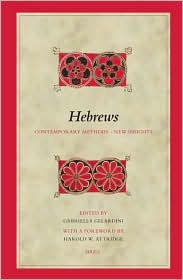The book display was small. Not a criticism of SECSOR; this just helped me realize how spoiled we are at the Annual Meeting. I think I've always taken it for granted that all those books in all those booths with all those publishing reps "just show up" every November.
The opportunities for social and informal engagement were deficient; there was one reception on Friday evening and a coffee break on Saturday morning, but other than that it was difficult to find time and ways to meet other scholars in the region. Also, the papers were limited to twenty-five minutes (including response time), which meant that the discussions of each paper were always cut short. We were busy the whole time, so I'm not sure there's time for more social engagement (a reception on Saturday night would be wonderful, but I realize this would have to be funded). But there were six sessions for papers, in addition to two plenary sessions and a few business meetings. Perhaps this could be reduced to five? or four? I know I would have enjoyed meeting some of the established scholars of the southeast and some of the very promising graduate students coming up out of our region.
The people were all very friendly. There wasn't a single paper or response that I thought seemed ill-intended or overly competitive. Perhaps some were, but I didn't experience them. Instead, all the papers (with only one or two exceptions) were excellent both for what I was provoked to think about and for what I couldn't help but argue with. And all the conversations about the papers were genuinely constructive (again, as I experienced them). I personally enjoy the slightly agonistic dynamics of the SBL Annual Meeting, but the more congenial tenor of SECSOR also struck a chord with my begrudging spirit.
This meeting seems to be an excellent venue for regional graduate as well as undergraduate to expose themselves to the field of biblical studies (beyond just its products [viz., books and articles]), to learn how to formulate and present their ideas persuasively and respectfully. I was disappointed by the relatively few number of institutions represented, though I suppose the current economic situation (as well as last-minute scheduling problems) would have affected attendance. Even so, if my own students (current and those who've gone on to seminary or graduate research) are interested in experiencing (and contributing to) professional biblical studies, SECSOR seems to be a good place for you.
A few days ago I had many other thoughts bouncing around in my head, but like ping-pong balls in a leaky lotto machine, many of them have managed to escape through an open (and unattended) orifice. I enjoyed SECSOR 2009, and I'm looking forward to the next meeting, in Atlanta next March (check their website). I hope to see some of you there.
Oh . . . One last thing. If you do come to the 2010 SECSOR meeting, make sure you have detailed, thorough, and clear directions before you set out for Atlanta. I found that, unlike other meetings, it doesn't do you any good to check into the convention hotel and ask the attendant at the check-in desk, "Can you tell me where to go to check in for SECSOR?" They just look at you blankly, wondering to themselves, "Sex or . . . what?"
[PS: I completely forgot . . . here's a quick list of what I bought from the book sellers:
As It Is Written: Studying Paul's Use of Scripture. Edited by Stanley E. Porter and Christopher D. Stanley. Atlanta: Society of Biblical Literature, 2008.
Matthew, James, and Didache: Three Related Documents in Their Jewish and Christian Settings. Edited by Huub Van De Sandt and Juergen K. Zangenberg. Atlanta: Society of Biblical Literature, 2008.

Hebrews: Contemporary Methods—New Insights. Edited by Gabriella Gelardini. Atlanta: Society of Biblical Literature, 2008.

I also ordered a copy of Common Judaism: Explorations in Second-Temple Judaism. Edited by Wayne O. McCready and Adele Reinhartz. Minneapolis: Fortress Press, 2008. But I'm considering this book for one of my graduate courses, so I got this one gratis. Woo-hoo (and thank-you)!


No comments:
Post a Comment